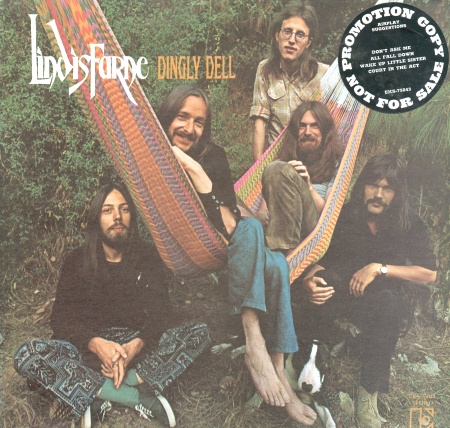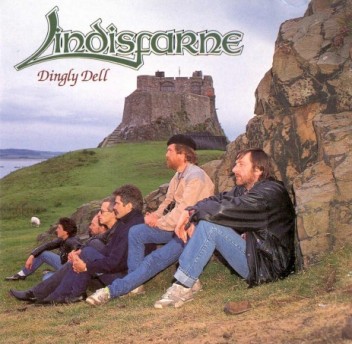Chris Charlesworth reports from Dublin, where Lindisfarne gave the first live performance of songs from their new album, Oct 1972
TO BE CASUAL is to be Lindisfarne, but even the most relaxed of bands have a hard time putting over a set of new numbers when an audience hitherto starved of their music demands the oldies all the time.
Lindisfarne opened their current UK tour at Dublin Stadium last week, but I doubt whether the reaction to the concert went anywhere near to rivalling the reaction at the two Newcastle shows at the weekend. Lindisfarne have reached the dilemma that comes to so many bands who "make it": how do you radically change a set when the fans want to hear the tunes they know? Lindisfarne - normally the happiest bunch of Geordies you could hope to meet - were tense and nervous before this show. It's unnecessary to say that after half a dozen shows they'll swing like clockwork again, but in Dublin - the venue probably added to their problems - it was a rather wooden band who scaled the converted boxing ring to win the hearts of the Irish.
They were about 80% successful and Genesis, the supporting act who are equally well known across the Irish Sea, were85 per centers. Dublin Stadium is a boxing ring, converted specially for rock concerts by removing the ring from the centre of the hall and building a stage up on one side. Thus the audience are on three sides of the stage, some people actually sitting behind the group. It holds around 2,000 and is Dublin's largest indoor hall. Draped everywhere are advert boards proclaiming the delights of Guinness, various newspapers and certain brands of cigarettes.
BEERY
The ushers have that beery look about them and then the announcer on stage tells us that B. B. King will be playing on the 'turd of next month. No one could doubt you're in Ireland.
Before the show Alan Hull falls asleep in the dressing room, stretched along a wooden table and uncommunicative to all but himself. Simon Cowe has taken an armful of instruments to another to begin the never ending job of tuning. Between them Lindisfarne have four guitars, three mandolins, two basses and a banjo - a lot of tuning.
The rest watch Genesis who seem to hold a spell over the audience. Late arrivals wreck any early atmosphere the band attempt to create but once settled it's obvious genesis are respected. Peter Gabriel resembles Tutankhamun with his partially shorn head and his elaborate necklace. His stories raise a laugh and the music brings cheers.
Genesis are not unlike Yes with their complicated precise and well rehearsed arrangements. The music is much harsher though and there's an overall feeling of the macabre in what they do. One song, says Gabriel is devoted to "Hammer Productions," and for another Gabriel dons a fox mask - remarkably lifelike too - and a long red dress. The effect is frightening but wandering minds are jolted back into life as bright flashes of burning magnesium explode on either side of the stage. "Musical Box" and "Giant Hogweed" are greeted by the crowd like old friends and Genesis leave the stage to a standing ovation. The reception does little to calm the minds of Lindisfarne who are still tuning and awaiting their turn anxiously.
Rab Noakes has short spot between the two groups. Essentially a club performer, Rab seems nervous when flanked by 2,000 people but his songs are well received, especially those which centre around drinking - the essential sport of the Irish. The audience clap along and he too has a standing ovation. Lindisfarne open with "Meet Me On The Corner", a safe selection which everybody knows. But there's a noticeable tension about them. Ray Jackson seems rooted to the spot and Rod Clements is edged into the background. Alan Hull seems determined at the front, ignoring the requests for "Fog On The Tyne" and "We Can Swing Together". Instead he grits his teeth and launches into a selection of songs no one has heard before in Ireland - or most other places for that matter.
 |
They do practically the whole of the "Dingly Dell" album. "Poor Old Ireland" quietens the crowd so the words can be heard and, much to Hull's relief, seems to please the Irish rather than antagonise them. |
 |
DIFFICULT
"Dingly Dell" itself is the most difficult to play. On record Lindisfarne are accompanied by brass and strings, but on stage Simon Cowe substitutes wah-wah guitar for both. The effect is not nearly so spell binding as on record and more subdued lighting would have helped. But it's a very brave attempt at a song with all the subtleties of "A Day In The Life" - and the tempo
changes.
The trilogy of songs is a little shaky but comes over well enough considering the changes in instruments that go on. Alan Hull does "All Fall Down" at the organ, switches to bass during the jig "Plankton's Lament" and ends up on guitar for "Bring Down The Government". After six gigs it'll doubtless run like clockwork.
A new song, not on the album and not heard before was included in this show. Titled "United States Of Mind" , it's another Hull melancholia with an outstanding instrumental break in the middle. It deserves to go on record. Lindisfarne closed with a new version of "We Can Swing Together". It's tighter and shorter and gone is Ray Jackson's lengthy harp solo. Inserted in its place is "Dingle Regatta" an instrumental track from the new album which sounds remarkably like an Irish reel. It was a good way to close the show, especially in Ireland.
Lindisfarne comment,
report and rock!